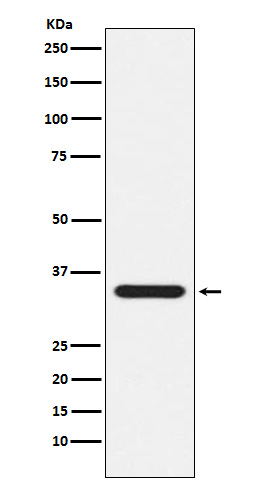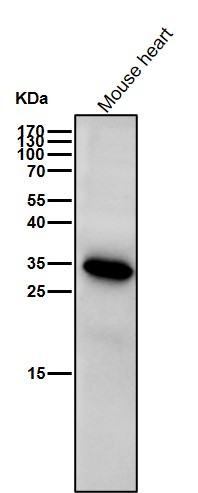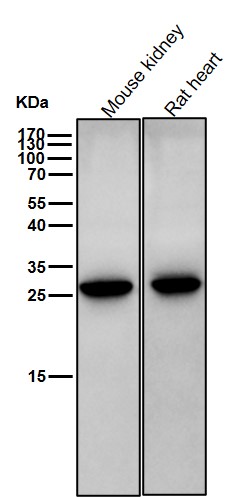


| WB | 咨询技术 | Human,Mouse,Rat |
| IF | 咨询技术 | Human,Mouse,Rat |
| IHC | 咨询技术 | Human,Mouse,Rat |
| ICC | 技术咨询 | Human,Mouse,Rat |
| FCM | 1/20-1/100 | Human,Mouse,Rat |
| Elisa | 咨询技术 | Human,Mouse,Rat |
| Aliases | AD3; Ad3h; FAD; Protein S182; PS1-CTF12; PSEN1; PSNL1; S182;;Presenilin 1 |
| WB Predicted band size | Calculated MW: 53 kDa ; Observed MW: 28 kDa |
| Host/Isotype | Rabbit IgG |
| Antibody Type | Primary antibody |
| Storage | Store at 4°C short term. Aliquot and store at -20°C long term. Avoid freeze/thaw cycles. |
| Species Reactivity | Human,Mouse,Rat |
| Immunogen | A synthesized peptide derived from human Presenilin 1 |
| Formulation | Purified antibody in PBS with 0.05% sodium azide,0.05% BSA and 50% glycerol. |
+ +
以下是3篇关于Presenilin1(PSEN1)抗体的参考文献及其简要摘要:
1. **"Endoproteolysis of Presenilin 1 and accumulation of processed derivatives in vivo"**
- **作者**: Thinakaran, G. 等(1996)
- **摘要**: 该研究利用特异性PSEN1抗体(针对N端和C端表位),通过免疫印迹和免疫沉淀技术,首次揭示了PSEN1在体内经历内源性蛋白酶切割,生成稳定的N端和C端片段。抗体验证了PSEN1加工过程与阿尔茨海默病中γ-分泌酶活性的关联。
2. **"Gamma-secretase cleavage of the amyloid precursor protein: Heterogeneity of the proteolytic products and effects of presenilin 1 mutations"**
- **作者**: Duff, K. 等(1996)
- **摘要**: 通过构建PSEN1基因敲除小鼠模型,并采用多种PSEN1抗体进行Western blot分析,研究发现PSEN1缺失导致γ-分泌酶活性丧失,且C92S突变显著增加Aβ42生成,抗体结果支持PSEN1在APP切割中的核心作用。
3. **"Functional gamma-secretase inhibitors reduce beta-amyloid peptide levels in brains of living PS1/APP transgenic mice"**
- **作者**: De Strooper, B. 等(2001)
- **摘要**: 研究通过PSEN1抗体结合免疫组化技术,证实抑制γ-分泌酶可降低转基因小鼠脑内Aβ沉积。抗体检测显示PSEN1在神经元中的定位与γ-分泌酶复合体的分布一致,进一步阐明其在淀粉样斑块形成中的机制。
这些文献均通过特异性抗体解析了PSEN1的蛋白加工、功能及其在阿尔茨海默病病理中的角色。
×